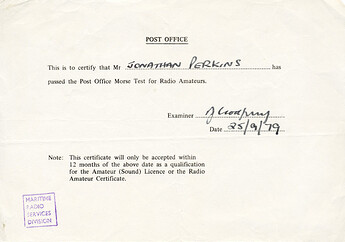I first got on the air in 1976 with a UK ‘class B’ G8 callsign that avoided morse but rrestricted me to 2m and above. I’d always wanted to get on HF so had to study for the 12wpm Post Office test. I was lucky that a local ham Reg G8QR was willing to spend the time (nearly every day) to get me to the required standard and I ended up with what appeared to be a rather insignificant piece of paper after a trip to London:
I did a little CW with a hand key but after university, work and life meant that I didn’t do any amateur radio until starting again last year, nearly 40 years later.
Whilst I hadn’t completely forgotten everything, its been almost like starting from scratch. I wanted to learn to use a paddle and thats been quite a battle. I’m sure its easier if you start younger.
The reason I wanted to post this is that I actually agree with both Tom and Victor. I hate using apps that spout out endless random letters - I find that totally uninspiring and lose interest very rapidly. What works for me is to get on the air with CW, the feeling of achievement is a real boost to continuing to study.
So I started using Tom’s approach: first I practised enough so that I could complete a CW chaser contact. Thats fairly easy and gets you some contacts in the log. I even made use of the rigs memory keyer to help get going.
Then recently, once my chasing was getting fairly error free and encouraged by Tom I did my first CW activations. This was very scary but having learnt its ok to make mistakes and ask ‘agn ?’ I made it ok. The one app that I can tolerate helped me here: Morse Runner, it does help practise head reading callsigns and prepared me for the pileup.
Now I’m at the stage where I want to be able to have proper CW QSOs. You don’t need to do this for SOTA but I’ve caught the bug now and want to do it. This I’ve found altogether another challenge and as Victor says it does need a lot of dedication to become really proficient. I joined the Long Island CW Club which has been a big help and very supportive. I’m only at the beginning of this journey, but I’ve just started making myself have a QSO a day. Some have been a bit of a car crash, but thanks to the friendlyness and patience of other CW ops its OK.
To answer Phil’s rhetorical question, no I don’t think CW should be mandatory for HF. But I am glad its there as I get a great buzz from making CW contacts. I’ve still got a long way to go to become proficient, some of my sending is still ropey, but I’m enjoying the journey. That’s what matters.
We’re lucky with SOTA that we have these different levels at which you can take part using CW, its not an ‘all or nothing’ thing.
Jonathan

